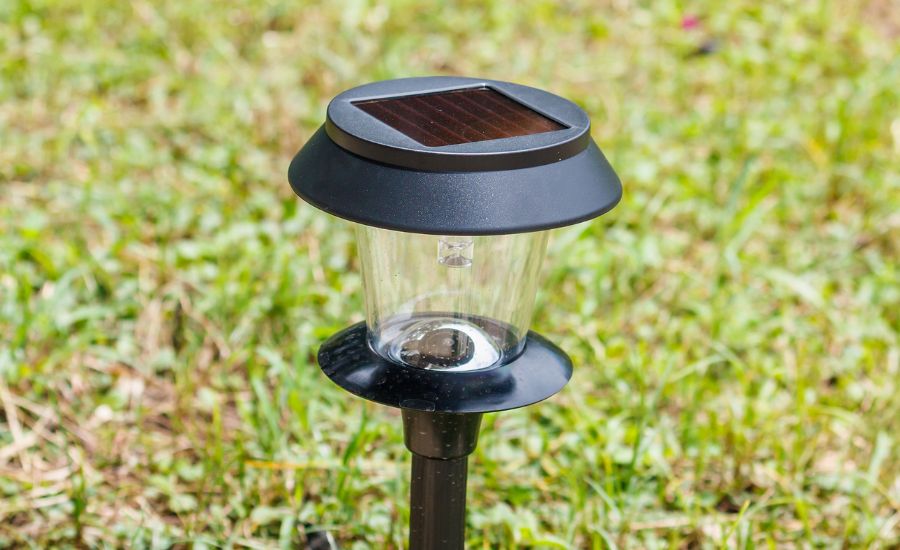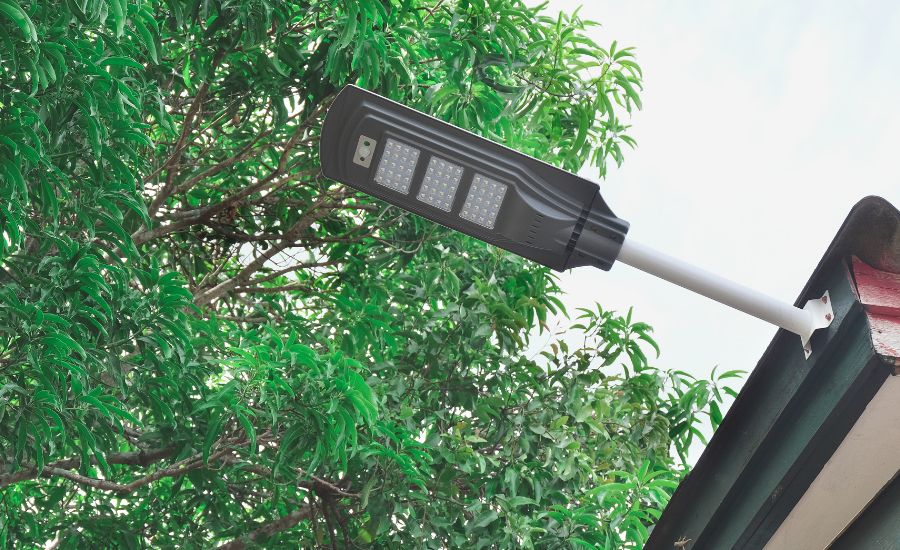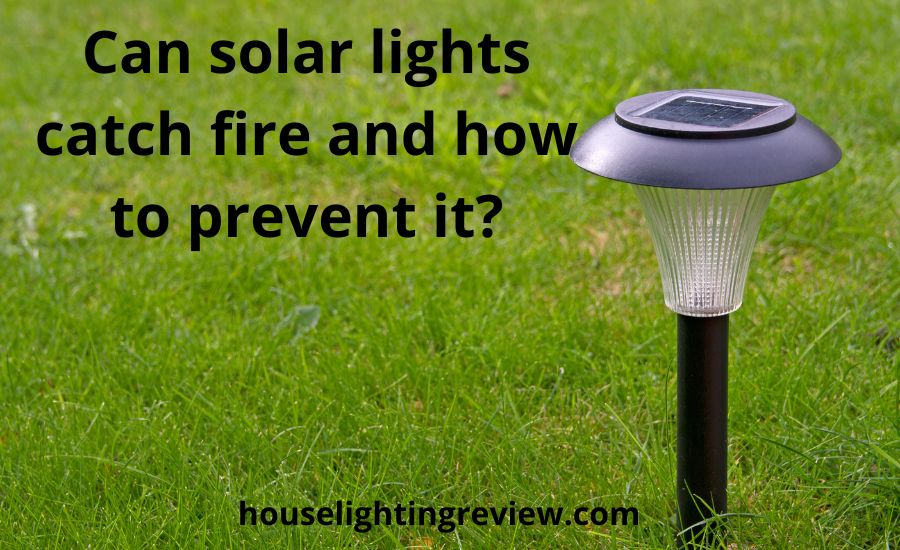Can solar lights catch fire? Solar lights are lighting devices that use energy harnessed from the sun to charge their internal batteries.
Solar lighting can be useful in areas without electricity or in natural settings where access to wired power is unavailable.
Solar lights can be used on streets, gardens, parks, parking lots, campsites, cottages, and on expeditions, also as solar security lights.
Outdoor solar lights and solar garden lights have an advantage over traditional lanterns because they don’t need to be recharged and do not require buying batteries.
Solar lights such as solar garden lights can operate for a long time when exposed to solar lighting.

Why are more people choosing solar lights with panels?
- Cost-effectiveness. The solar panel and solar light do not require electricity from the grid, which allows for savings on electricity costs and reduced electricity bills.
- Eco-friendliness. The solar panel and solar light are an environmentally friendly source of energy and solar lighting, as they do not produce harmful emissions into the atmosphere.
- Reliability. Solar panels and solar light do not contain moving parts and have a long lifespan (up to 25 years on average). They do not require constant maintenance and are not prone to breakdowns.
- Convenience. Solar panel and solar light are easy to install and can be used in any conditions where there is access to sunlight.
- Independence. The solar panel and solar light allow for independence from grid power, which is especially important in regions where there are problems with constant electricity supply.
How do solar lights work?
Solar panels installed on the lanterns are responsible for collecting solar energy, which in turn powers outdoor solar lights and solar garden lights.
The energy is then stored in built-in batteries and used to power LEDs that illuminate the surrounding environment.
Solar lights do not require a connection to an electrical grid and can operate in almost any condition as long as there is enough sunlight.
Is it possible for solar-powered lights to ignite flames?
If the batteries of outdoor solar lights and solar garden lights become too hot then lights can catch fire. The excessive accumulation of energy can lead to lights can catch fire.
Also, lights can catch fire when a power surge occurs. However, this rarely occurs and only with improper use or violation of operating instructions. Overall, solar batteries with lanterns are considered safe and environmentally friendly devices.
Is it okay to keep solar lights on continuously?
Solar lights usually lack an on/off switch and instead rely on automatic sensors to activate when night falls. Yet, if your solar light does possess a switch, it is recommended to switch it off when not in use.
Keeping your solar lights on continuously will gradually deplete the battery, potentially leading to increased expenses for battery replacement and an increased danger of fire.
Fortunately, these lights can still recharge while turned off, reducing any concerns. Similarly, solar lights are not intended to operate in daylight, whether they have an on/off switch or not.
Additionally, you may wonder about the duration of their runtime throughout the night.
Solar lights come with different performance timeframes on a complete charge. Generally, solar lights can survive for approximately six to eight hours on a single charge, based on the particular type of product.
Additionally, the durability of your solar lights is determined by their batteries. So, if you notice that your solar light’s battery discharge is inadequate, it’s an indication that you may have to swap the batteries.
Fire in solar-powered lights
Solar lights catching fire can occur for several reasons:
- Battery overheating may be the reason lights catch fire. If the lantern is left in the sun or other warm places, solar batteries can overheat, leading to damage or explosion and catching fire.
- Battery damage. If the solar battery is damaged, for example, due to impact or falling, it can lead to catching fire.
- Improper use. If the lantern is used in inappropriate conditions, for example during rain or strong wind, it can lead to damage or catching fire.
These factors can lead the lights catch fire.
Solar battery
Solar-powered lighting often ignites due to issues with the battery. Damaged batteries can create overheating and leaks, which can easily ignite when near combustible materials like dry leaves. This is particularly true for solar lights such as solar garden lights that utilize Lithium-ion batteries.
Although lithium batteries can store more energy in a compact form than other types of batteries, they are prone to combustion when exposed to high temperatures and can catch fire if mishandled or improperly manufactured.
These batteries contain individual cells that are immersed in a potentially hazardous mixture of lithium salts and organic solvents.
Many reputable solar lights manufacturers that utilize Li-ion batteries typically incorporate an intelligent controller.
This safeguard allows for the monitoring of battery performance, ensuring that it remains undamaged and does not overheat or become overcharged. This controller may even possess the ability to shut down the solar lights if any damage is detected.
Defective electrical installation for solar-powered lights
Incorrect electrical connections in your solar light can lead to a fire. Inadequately installed or improperly repaired solar lights such as solar garden lights may catch fire, especially if tampered with or modified by an untrained individual. It is crucial to understand that while DIY can be a great option, you should avoid handling devices or appliances that pose a safety hazard.
Thus, it is recommended to enlist the help of an expert technician for solar lights that present faults or broken glass panels. This is because faulty wiring may trigger a short circuit, which may result in a possible fire.
Poor quality materials for solar-powered lights
Understanding the importance of low-quality solar lights being a potential fire hazard is crucial. Manufacturers of these solar lights use cheaper and substandard materials to reduce the cost, making them more accessible to consumers.
However, such low-quality materials are usually not fire-resistant, increasing the risk of the solar lights overheating and catching fire.
Furthermore, they do not have in-built safety mechanisms to limit battery overload, which leads to more hazards.
While high-quality solar lights are more expensive, they are much safer and have a lower risk of fire due to the use of superior materials and production standards.
In what manner do solar-powered lights accumulate energy?
Solar lights accumulate energy through the photovoltaic effect. The solar panels inside the lantern consist of silicon plates that absorb photons of solar lights and convert them into electrical energy.
The energy is then directed into a battery that charges it. As a result, solar-powered lanterns harness energy from sunlight, making them more environmentally friendly and cost-effective to use.
In addition, solar lights do not require a connection to the electrical grid, which greatly simplifies their installation and use. Solar lights are easy to maintain, as they do not require battery replacement or servicing.
Solar lights are safe to use as they do not contain hazardous chemicals. Solar lights can be used to illuminate streets, gardens, parks, terraces, suburban homes, and many other places.
Solar lights are an effective solution for outdoor lighting in the absence of electricity and for energy conservation.
Types of batteries
General information about batteries for storing solar lights energy.
Ni Cad (Nickel Cadmium) for solar lights
Nickel-cadmium batteries are one of the most commonly used types of rechargeable batteries. Nickel metal hydrides are used in a wide range of devices such as mobile phones, portable gaming devices, flashlights, and other devices that require a portable power source.
The advantages of nickel-cadmium batteries include high energy density, short-term overload, resistance to high temperatures, and relatively low cost. However, nickel-cadmium batteries also have disadvantages.
They may have a memory effect that is manifested when the battery is not fully charged, which can lead to a loss of its capacity over time.
They also have lower capacity compared to other types of batteries. Overall, nickel-cadmium batteries are a good choice for small portable devices, but for larger devices such as laptops, more powerful types of batteries may be required.
Lead Acid batteries for solar lights
Sealed lead-acid batteries (SLA) are the most common type of batteries. The main component of lead-acid batteries is lead plates submerged in an electrolyte based on sulfuric acid.
When the battery discharges, electrochemical reactions occur on the surface of the lead plates, converting chemical energy into electrical energy. The process is reversed during charging.
The advantages of lead-acid batteries include their low cost, wide availability, high resistance to overcharging, and excellent performance at high temperatures.
However, they also have disadvantages – they do not support deep discharge and charging, limited lifespan, and lower energy density.
Li-ion solar lights
The main component of lithium-ion batteries is the lithium-ion battery, which produces electrical current as a result of electrochemical reactions between the lithium electrode and the cathode.
The lithium-ion battery receives charge from a power source during charging, and it releases charge to an electronic device during discharging.
The advantages of lithium-ion batteries are their small size and weight, high energy capacity, and ability to charge quickly.
They have certain disadvantages, such as limited lifespan and the possibility of overheating and explosion if not used according to the manufacturer’s instructions.
Despite this, lithium-ion batteries are the predominant and highly efficient type of battery utilized in contemporary electronic gadgets.
How can the probability of solar lights lights catch fire?
We will discuss safety measures to prevent solar lights catching fire. By following these precautions, you can ensure your solar light fire.
Be cautious of inexpensive items
If you want to minimize the possibility of purchasing a solar-powered light that has a greater chance of catching fire, it’s advisable to steer clear of low-priced items. It’s worth mentioning that Li-ion batteries are not cost-effective, but make solar lights safe.
Decide to buy from reliable retailers and trustworthy brands
To avoid any risk of catching fire, it’s important to do a thorough research and opt for a reliable seller when buy solar lights.
Buy solar lights with the instruction. Solar lights dangerous to buying, hence it is advisable to choose a reputable brand that is known for producing high-quality products and purchase solar lights that contain good-quality components. Opting for cheap solar lights should be avoided.
Properly install the solar-powered lights
Ensure the correct installation of modern solar-powered lights by following the instructions provided. Installing modern solar lights is simple if done by the guidelines.
Turn them off when they are not being used
It is recommended to switch off most solar lights whenever they are not in use, especially if they have a button switch for powering on and off. The majority of solar lights come with an on/off switch.

FAQ
Is it OK to leave solar lights on all night?
So, can you leave solar lights on all night? It generally depends on the capacity of the solar cells and battery and the amount of light/energy they get during the day.
If the solar light is designed to operate automatically, solar-powered lights, such as solar garden lights, can be left on all night as long as it is located in an area that receives full sunlight during the day.
However, leave solar light (solar garden lights) on all night can sometimes result in decreased battery life over time.
Are solar string lights a fire hazard?
Solar string lights are considered safe and not a significant fire hazard. Because they are powered by solar panels. The only thing that can solar string lights due to battery voltage fluctuation.
Do solar light bulbs get hot?
They do not get as hot as incandescent bulbs because they do not use the same technology to produce light. Solar light bulbs usually use LED lights technology, which generates far less heat than conventional incandescent bulbs.
Is it common for solar panels to catch fire?
No, it is not common for solar panels to catch fire. However, like any electrical device or system, there is a potential for fire if proper installation and maintenance procedures are not followed.
Conclusions
Solar-powered light now is more popular. Solar lights safe are used to illuminate streets and gardens. Can solar lights catch fire?
Most solar lights are fire-resistant. To avoid fires in solar-powered light, it can solar-powered lights is necessary to follow basic rules of use and storage.


